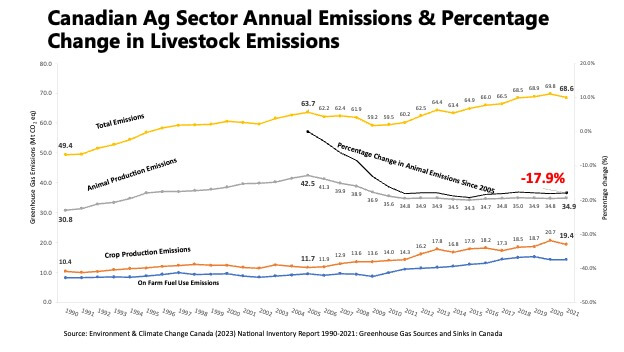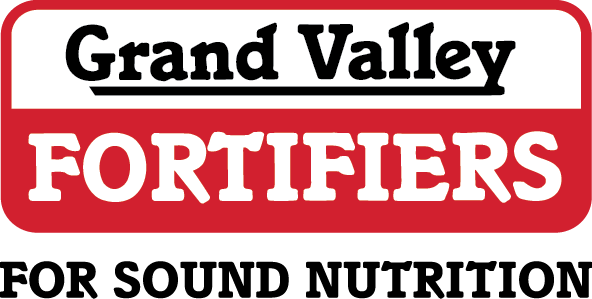By: Bruce Schumann, M.Sc.
Director of Sustainability, Regulatory and Quality Assurance
Grand Valley Fortifiers
In its simplest definition sustainability is “Meeting the needs of the present without compromising the ability of future generations to meet their own needs.”
Consumers place heavy emphasis on the environmental side of sustainability, but for farmers to be sustainable it is much more than that. Farmers are not only excellent stewards of their land and the livestock they raise, but also take care of the people that work for them, comply with all the regulatory constraints and need to be profitable while doing so. Sustainability is the sweet spot where environment, economic (profitability) and social goals all overlap.
Many companies within the livestock supply chains are making voluntary commitments towards sustainability, with a heavy emphasis on reducing the environmental impact. The Canadian Securities Administrators (CSA) are working to establish requirements for Canadian publicly traded companies to make climate-related disclosures in response to demands from investors and other stakeholders for “complete, consistent and comparable” reporting. For many of these companies, most of their greenhouse gas (GHG) emissions (between 50 – 85%), originate from their raw materials coming into their plant (upstream) and the final product destinations (downstream) after they have left the processing plant. So, the commitments publicly traded companies make for reductions in GHG emissions in the livestock sector, will be heavily reliant upon primary producers for that change.
Canada accounts for roughly 1.5% (Government of Canada. 2022 “Global greenhouse gas emissions.”) of the world’s GHG emissions and of that 1.5%, Canadian agriculture (crops & livestock) is responsible for only 8.2% of our total GHG emissions. So Canadian agriculture contributes 0.12% of the Global GHG emissions. To put this into perspective China and the USA jointly account for ~39% of the worlds GHG emissions. Despite our small contribution to the overall emissions in the world, 196 countries around the world, including Canada, have all made climate commitments, through the Paris Agreement, to reduce their total GHG emissions from 2005 levels by 43% by 2030 (United Nations Climate Change).
We are a nation that produces some of the most sustainable pork, chicken, beef, milk and eggs in the world, and we are continually improving. At the farm level, GVF’s purpose is to help our customers, like you, to achieve the best possible production at the lowest possible cost. We firmly believe that the most efficient producers will ultimately become the most profitable and the most sustainable. The improvements in economic and production efficiencies will not only put more dollars in the hands of farmers, but it will also decrease the greenhouse gas emission intensities, by producing more with less. Environment and Climate Change Canada in 2023 reported Canadian Livestock Production emissions since 1990 (Figure 1). Livestock numbers in Canada have increased by 46.9% between 2004 and 2021 (predominantly from increasing swine and poultry numbers). Despite producing 47% more livestock, our livestock production emissions have only increased by 13% since 1990. And since 2005, Canadian farmers have reduced total livestock emissions by almost 18%.
Figure 1. Canadian Ag Sector Annual Emissions & Percentage Change in Livestock Emissions

Source: Environment & Climate Change Canada (2003) National Inventory Report 2004-2021: Greenhouse Gas Sources and Sinks in Canada
As a company and as an industry we are committed to advocating for livestock producers and the crucial role livestock has and will continue to play in feeding the world. Grand Valley Fortifiers has commenced some sustainability initiatives, with more to come in the future. We have begun adding pro-agriculture, sustainability messages on our newest trucks to help educate the general public how Canadian farmers already produce some of the most sustainable pork, beef, dairy and poultry products in the world.
We have performed on-farm environmental assessments for some of our pork, dairy and poultry producers. Our initial results confirm what we believed. We know that ~70% of total livestock emissions comes from feed, and so, land-based producers, manufacturing their own-feed on farm and using ingredients grown and harvested under their control, are the most environmentally efficient compared to the national averages. This puts these livestock producers in a powerful position when processors and grocery stores are looking for demonstratable lower carbon-footprint livestock for their supply chain and hopefully to take advantage of carbon credits in the future.
It is therefore critical to track growth and production throughout your entire operation. GVF’s sustainability mission is to enable livestock operations with data-driven insights, and business intelligence solutions to optimize feed & production efficiency, profitability, and resource stewardship, fostering ever-improving meat, milk and egg production.
We are working with producers to capture, analyze, interpret and make informed decisions to allow them to be the most efficient, most profitable and most sustainable as they can be. For more information on how GVF can help improve your farm sustainability, contact Bruce Schumann or your GVF Livestock Business Consultant today.
References:
https://unfccc.int/process-and-meetings/the-paris-agreement
https://www.canada.ca/en/environment-climate-change/services/environmental-indicators/
global-greenhouse-gas-emissions.html
This article was written for the Fall 2024 Swine Grist. To read the whole Swine Grist, click the button below.

